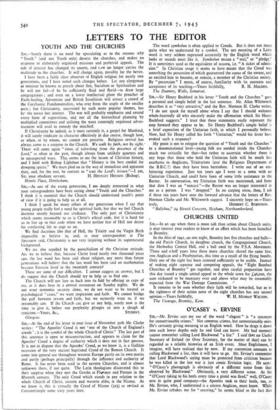SIR,—As one of the rising generation, I am deeply interested
in what your correspondents have been saying about "Youth and the Churches." I think it is essential that the Church should understand youth's point of view if it is going to help us at all.
I think I speak for many others of my generation when I say that young people really feel a need for spiritual faith, but that we feel Church doctrine mostly beyond our credence. The only part of Christianity which seems reasonable to us is Christ's ethical code, but it is hard for us to live up to that code when we have neither fear of Hell nor desire for everlasting life to urge us on.
We find doctrines like that of Hell, the Trinity and the Virgin Birth impossible to believe in, and, as your correspondent in The Spectator said, Christianity is not very inspiring without its supernatural background.
We are also repelled by the parochialism of the Christian attitude. Arc we to believe that, because Christ lived nearly two thousand years ago, the last word has been said about religion, any more than future generations will believe that the last word has been said on mathematics because Einstein lived in the twentieth century?
These are some of our difficulties. I cannot suggest an answer, but I do suggest that the Church should try to help us to find one.
The Church will not lure us back into its fold by offering us cups of tea, as it does here in a central restaurant on Sunday nights. We do not want economic security alone, we do not want to be treated as psychological "cases," we want inspiration and faith. We cannot bridge the gulf between reason and faith, but we earnestly want to, if we reasonably can. If the Church car. give us any help, surely now is the time to give it, before our perplexity plunges us into a slough of






























 Previous page
Previous page